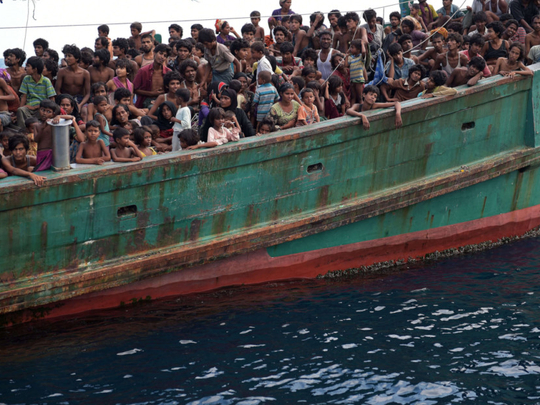
Once again the Rohingya crisis has come to the limelight of the international media. This time, thousands of Rohingya were found adrift in the sea without adequate food, water and other provisions in their boats for several days with no place to settle. Several boats carrying Rohingya refugees and Bangladeshi migrants are found stranded in the Andaman sea, Strait of Malacca and along the coast off Thailand, Malaysia and Indonesia.
Some boats carrying more than 2000 people were allowed to settle in the Indonesian province of Aceh and the Malaysian offshore island of Lankawi after fishermen rescued them when their boats were about to sink. However, the Indonesian authorities have turned away other boats approaching their coast and the same was done by Thailand and Malaysia. Despite the fact that the United Nations, human rights organisations, high profile politicians and individuals have urged these countries to allow the people to settle on their shores on humanitarian grounds, so far, nothing has been done. Each country is pointing fingers at the other, insisting that it is not their problem and that they are not responsible to accommodate them.
It is obvious why the Rohingya people are leaving their families and homes in Arakan in addition to putting their lives at risk. They are not economic migrants as some people wrongly refer to them. If they were economic migrants, why would only the Muslim Rohingya flee from Arakan and not the Buddhist Rakhine? Since 2012, the Rohingya have been mass murdered, thousands have perished and more than 150,000 people have been herded to so-called Internally Displaced Peoples (IDP) camps, which are in fact concentration camps or open air prisons with no access to food, clothing, healthcare services. Those who are living outside the IDP camps are also subjected to continuous oppression and repression, killing, torture, rape and slave labour.
This tragic situation besetting the Rohingya people compels them to take this hard decision to abandon their homes and leave. Therefore, the crux of the Rohingya migration problem lies in the attitude of the Burmese regime, whose treatment of the Rohingya people has been described as crimes against humanity. However the Burmese government, as usual, has rejected the call for humanity and to change their policy on the Rohingya.
It is the need of the hour for neighbouring countries and the international community to find the ultimate solution to this long standing grave problem. At the moment, saving the lives of tens of thousands of people who are described as virtual human coffins floating on the surface of the sea is of paramount importance.
— The reader is a Burmese managing director based in Sharjah










